Critical Thinking and Managerial Decision Making in Grocon Company
VerifiedAdded on 2022/11/23
|8
|2744
|452
Essay
AI Summary
This essay explores the critical thinking and managerial decision-making skills essential for a management career, particularly within the context of the Grocon Company. The author aims to develop skills in deductive, inductive, and abductive reasoning, as well as understanding psychological contract theory. The essay delves into the application of these concepts in professional, interpersonal, and personal scenarios, highlighting their importance for problem-solving, strategic planning, and effective communication. It discusses the strengths and weaknesses of each approach, and reflects on the author's personal development in these areas, including plans to improve decision-making skills through observation, listening, and considering diverse perspectives. The essay emphasizes the necessity of analytical skills and rational decision-making for managers, and the application of these skills in areas like employee management, strategy creation, and personal relationships.
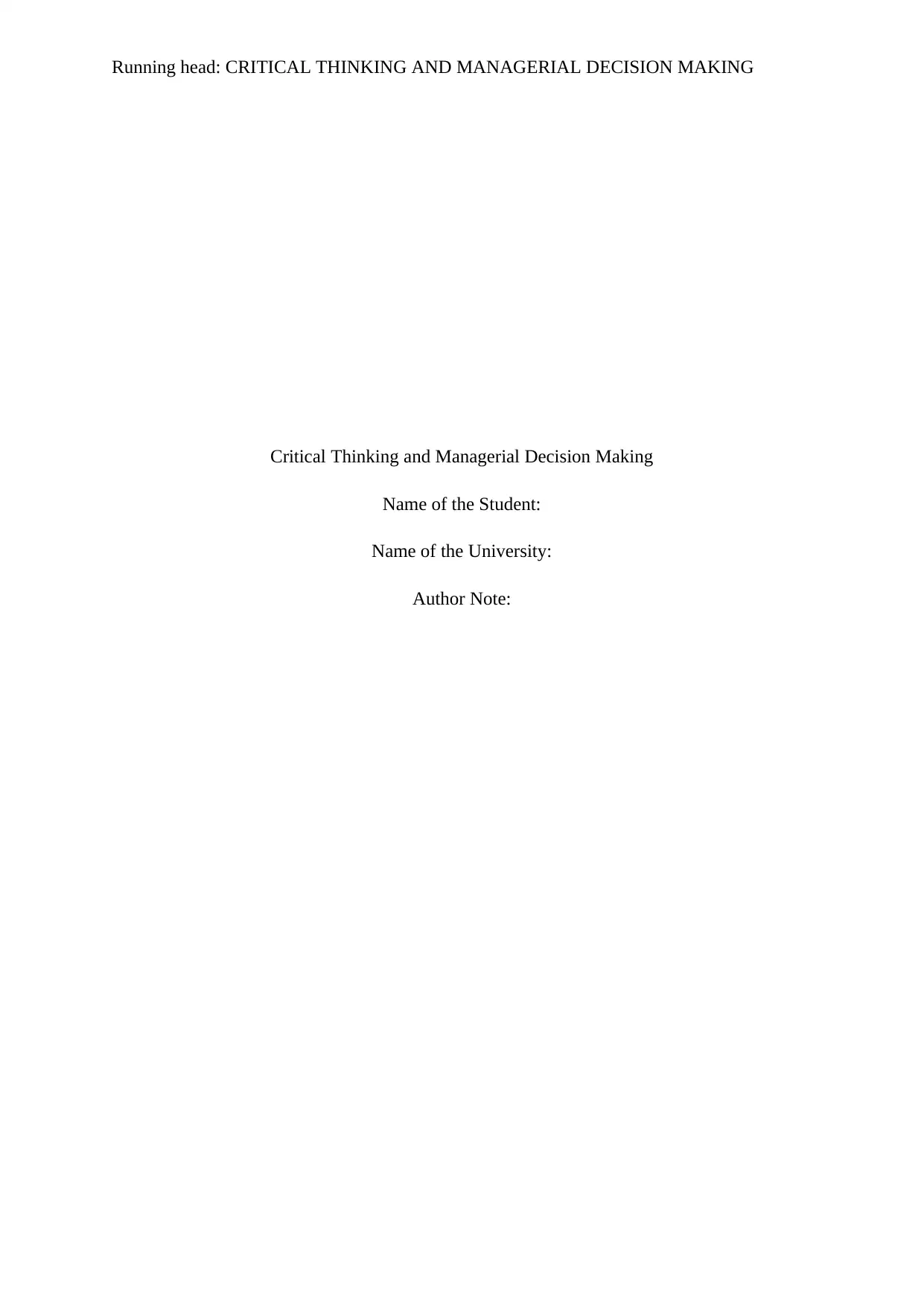
Running head: CRITICAL THINKING AND MANAGERIAL DECISION MAKING
Critical Thinking and Managerial Decision Making
Name of the Student:
Name of the University:
Author Note:
Critical Thinking and Managerial Decision Making
Name of the Student:
Name of the University:
Author Note:
Paraphrase This Document
Need a fresh take? Get an instant paraphrase of this document with our AI Paraphraser
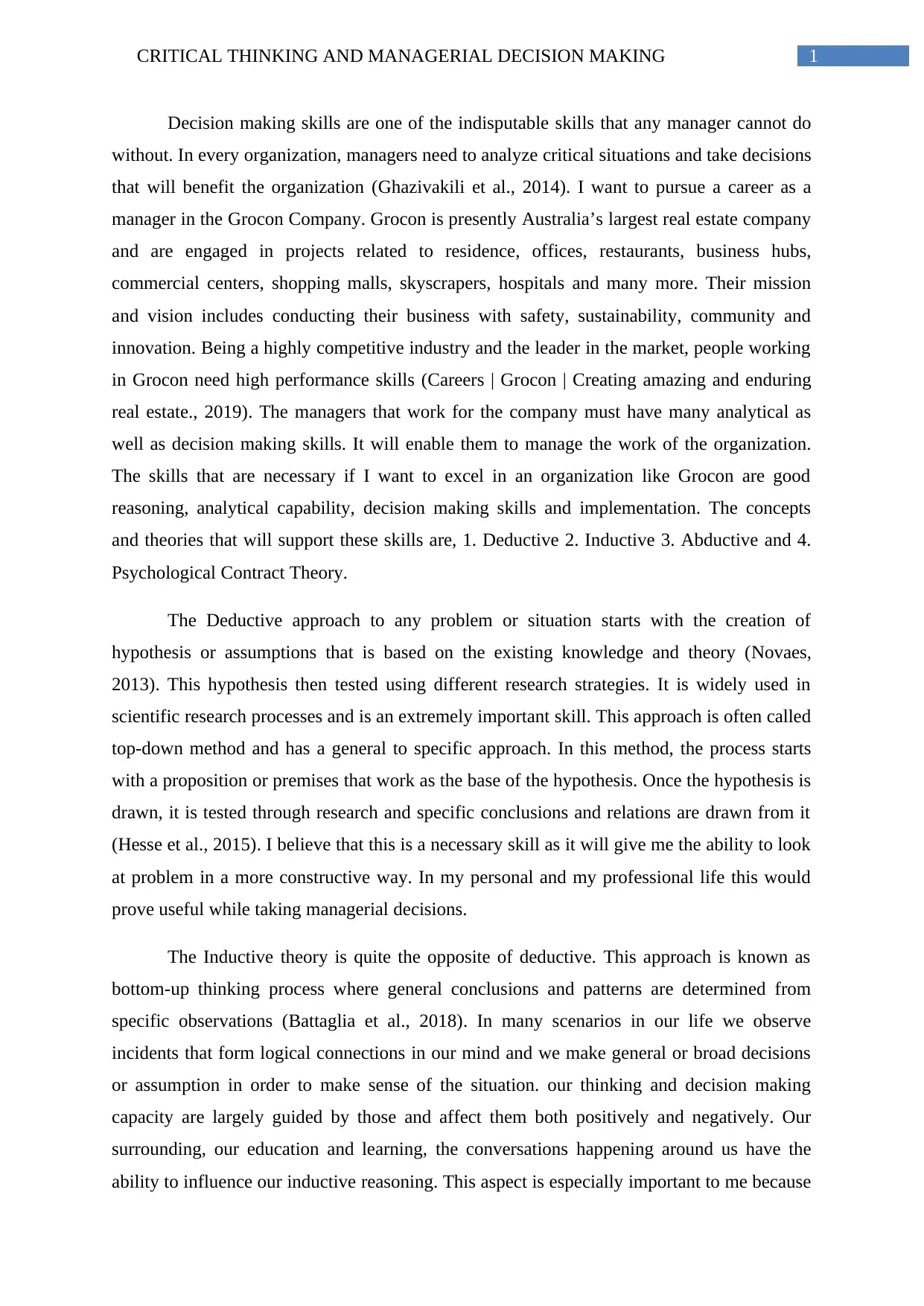
1CRITICAL THINKING AND MANAGERIAL DECISION MAKING
Decision making skills are one of the indisputable skills that any manager cannot do
without. In every organization, managers need to analyze critical situations and take decisions
that will benefit the organization (Ghazivakili et al., 2014). I want to pursue a career as a
manager in the Grocon Company. Grocon is presently Australia’s largest real estate company
and are engaged in projects related to residence, offices, restaurants, business hubs,
commercial centers, shopping malls, skyscrapers, hospitals and many more. Their mission
and vision includes conducting their business with safety, sustainability, community and
innovation. Being a highly competitive industry and the leader in the market, people working
in Grocon need high performance skills (Careers | Grocon | Creating amazing and enduring
real estate., 2019). The managers that work for the company must have many analytical as
well as decision making skills. It will enable them to manage the work of the organization.
The skills that are necessary if I want to excel in an organization like Grocon are good
reasoning, analytical capability, decision making skills and implementation. The concepts
and theories that will support these skills are, 1. Deductive 2. Inductive 3. Abductive and 4.
Psychological Contract Theory.
The Deductive approach to any problem or situation starts with the creation of
hypothesis or assumptions that is based on the existing knowledge and theory (Novaes,
2013). This hypothesis then tested using different research strategies. It is widely used in
scientific research processes and is an extremely important skill. This approach is often called
top-down method and has a general to specific approach. In this method, the process starts
with a proposition or premises that work as the base of the hypothesis. Once the hypothesis is
drawn, it is tested through research and specific conclusions and relations are drawn from it
(Hesse et al., 2015). I believe that this is a necessary skill as it will give me the ability to look
at problem in a more constructive way. In my personal and my professional life this would
prove useful while taking managerial decisions.
The Inductive theory is quite the opposite of deductive. This approach is known as
bottom-up thinking process where general conclusions and patterns are determined from
specific observations (Battaglia et al., 2018). In many scenarios in our life we observe
incidents that form logical connections in our mind and we make general or broad decisions
or assumption in order to make sense of the situation. our thinking and decision making
capacity are largely guided by those and affect them both positively and negatively. Our
surrounding, our education and learning, the conversations happening around us have the
ability to influence our inductive reasoning. This aspect is especially important to me because
Decision making skills are one of the indisputable skills that any manager cannot do
without. In every organization, managers need to analyze critical situations and take decisions
that will benefit the organization (Ghazivakili et al., 2014). I want to pursue a career as a
manager in the Grocon Company. Grocon is presently Australia’s largest real estate company
and are engaged in projects related to residence, offices, restaurants, business hubs,
commercial centers, shopping malls, skyscrapers, hospitals and many more. Their mission
and vision includes conducting their business with safety, sustainability, community and
innovation. Being a highly competitive industry and the leader in the market, people working
in Grocon need high performance skills (Careers | Grocon | Creating amazing and enduring
real estate., 2019). The managers that work for the company must have many analytical as
well as decision making skills. It will enable them to manage the work of the organization.
The skills that are necessary if I want to excel in an organization like Grocon are good
reasoning, analytical capability, decision making skills and implementation. The concepts
and theories that will support these skills are, 1. Deductive 2. Inductive 3. Abductive and 4.
Psychological Contract Theory.
The Deductive approach to any problem or situation starts with the creation of
hypothesis or assumptions that is based on the existing knowledge and theory (Novaes,
2013). This hypothesis then tested using different research strategies. It is widely used in
scientific research processes and is an extremely important skill. This approach is often called
top-down method and has a general to specific approach. In this method, the process starts
with a proposition or premises that work as the base of the hypothesis. Once the hypothesis is
drawn, it is tested through research and specific conclusions and relations are drawn from it
(Hesse et al., 2015). I believe that this is a necessary skill as it will give me the ability to look
at problem in a more constructive way. In my personal and my professional life this would
prove useful while taking managerial decisions.
The Inductive theory is quite the opposite of deductive. This approach is known as
bottom-up thinking process where general conclusions and patterns are determined from
specific observations (Battaglia et al., 2018). In many scenarios in our life we observe
incidents that form logical connections in our mind and we make general or broad decisions
or assumption in order to make sense of the situation. our thinking and decision making
capacity are largely guided by those and affect them both positively and negatively. Our
surrounding, our education and learning, the conversations happening around us have the
ability to influence our inductive reasoning. This aspect is especially important to me because

2CRITICAL THINKING AND MANAGERIAL DECISION MAKING
these reasoning are much more flexible than the deductive ones as they are not completely
supported by facts or hard truths. Thus, in adaptive scenarios, inductive reasoning can
provide us with opportunities where we are able to examine our own assumptions with facts
and figures.
The abductive theory is based on prior knowledge and experience of the individual. In
this thinking method, people often become prejudiced or blinded by their prior knowledge
and cannot think outside the box (Mirza et al., 2014). Using abductive thinking, they may
invite new perspectives into the matter from people that are around them and those that he
thinks are less experienced than him. In many cases, a person’s prior knowledge helps us to
understand a situation better. This is the reason why older people are sought after for advice
in both social and professional scenarios. Coupled with a person that have the ability to give a
fresh perspective on old incidents, this thinking process might prove to be formidable in all
spheres of life and that is the reason for which I think this skill to be an important aspect
(Kaiser, Fordinal & Kragulj, 2014).
Psychological contract theory is about the implied or explicit conditions in a contract.
A successful Psychological Contract generally has several characteristics. They should be
voluntary, mutually agreed and incomplete in nature. There are generally multiple people
involved in the process and if it fails the losses needs to be managed. This method is applied
in interpersonal and professional scenarios (Eckerd et al., 2013). There are three types of
Psychological Contract, relational, transactional and hybrid. Each of them contains different
aspects that create basis for organizational contracts depending on the type and job
description for which the contract is being made. Having the ability to form Psychological
contract is necessary as they provide guidelines about the expectations of the employees and
the likely reactions and losses that the fail of the contract may cause. This is extremely
necessary for managerial profession.
The concepts and knowledge about the above mentioned theories will help me in my
personal, interpersonal and professional life. In professional scenario I will need them for my
job as a manager in Grocon. Grocon is a large business and thus appoints a large number of
human resources. The company also runs several processes and as a manager I will need to
think each issue critically, rationalize the key aspects and take decisions. The managers need
to create plans and strategies for profit making and brand popularity. Manage projects and
their on-time delivery and recruit and manage employees. The concepts that I learned will
these reasoning are much more flexible than the deductive ones as they are not completely
supported by facts or hard truths. Thus, in adaptive scenarios, inductive reasoning can
provide us with opportunities where we are able to examine our own assumptions with facts
and figures.
The abductive theory is based on prior knowledge and experience of the individual. In
this thinking method, people often become prejudiced or blinded by their prior knowledge
and cannot think outside the box (Mirza et al., 2014). Using abductive thinking, they may
invite new perspectives into the matter from people that are around them and those that he
thinks are less experienced than him. In many cases, a person’s prior knowledge helps us to
understand a situation better. This is the reason why older people are sought after for advice
in both social and professional scenarios. Coupled with a person that have the ability to give a
fresh perspective on old incidents, this thinking process might prove to be formidable in all
spheres of life and that is the reason for which I think this skill to be an important aspect
(Kaiser, Fordinal & Kragulj, 2014).
Psychological contract theory is about the implied or explicit conditions in a contract.
A successful Psychological Contract generally has several characteristics. They should be
voluntary, mutually agreed and incomplete in nature. There are generally multiple people
involved in the process and if it fails the losses needs to be managed. This method is applied
in interpersonal and professional scenarios (Eckerd et al., 2013). There are three types of
Psychological Contract, relational, transactional and hybrid. Each of them contains different
aspects that create basis for organizational contracts depending on the type and job
description for which the contract is being made. Having the ability to form Psychological
contract is necessary as they provide guidelines about the expectations of the employees and
the likely reactions and losses that the fail of the contract may cause. This is extremely
necessary for managerial profession.
The concepts and knowledge about the above mentioned theories will help me in my
personal, interpersonal and professional life. In professional scenario I will need them for my
job as a manager in Grocon. Grocon is a large business and thus appoints a large number of
human resources. The company also runs several processes and as a manager I will need to
think each issue critically, rationalize the key aspects and take decisions. The managers need
to create plans and strategies for profit making and brand popularity. Manage projects and
their on-time delivery and recruit and manage employees. The concepts that I learned will
⊘ This is a preview!⊘
Do you want full access?
Subscribe today to unlock all pages.

Trusted by 1+ million students worldwide
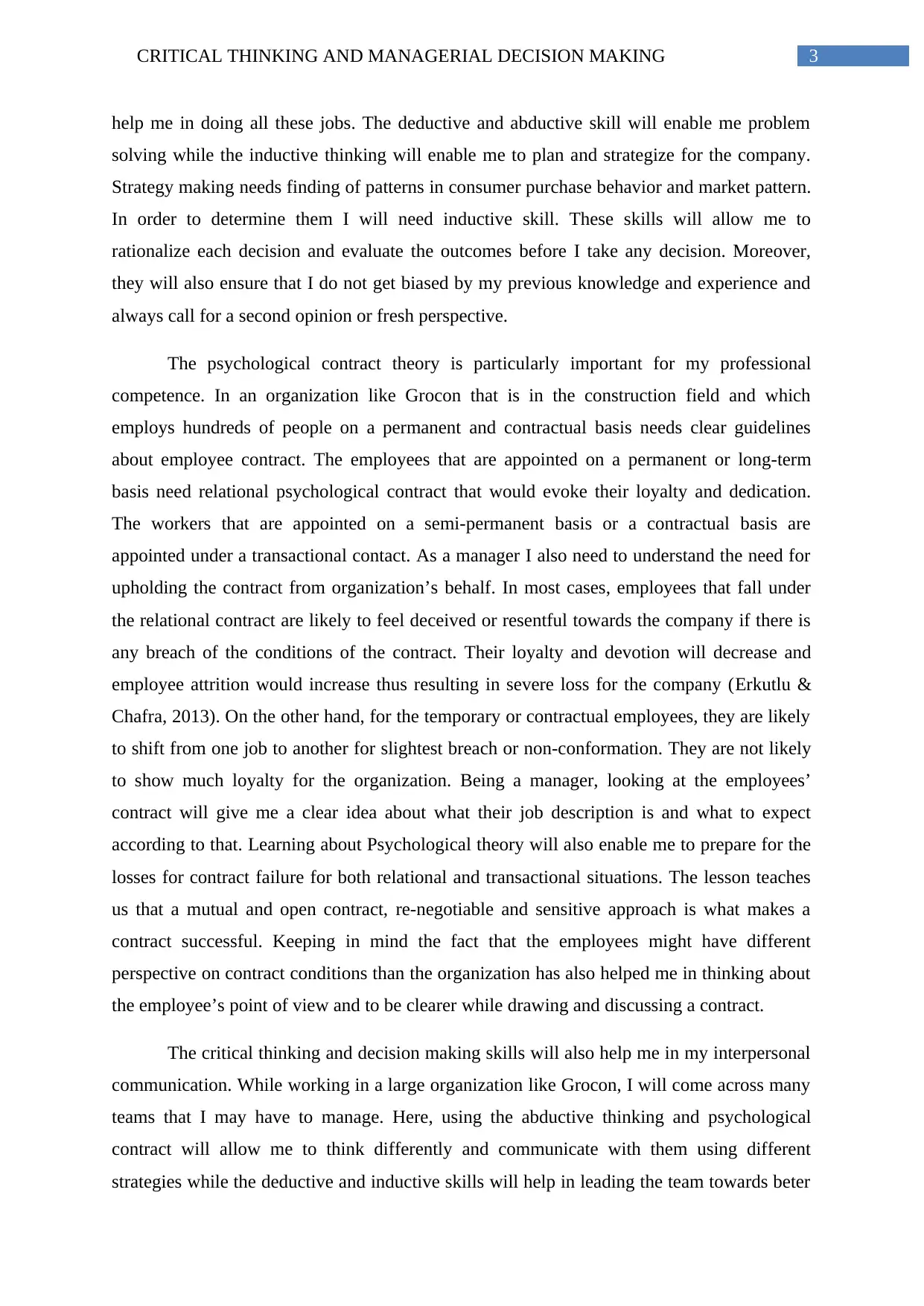
3CRITICAL THINKING AND MANAGERIAL DECISION MAKING
help me in doing all these jobs. The deductive and abductive skill will enable me problem
solving while the inductive thinking will enable me to plan and strategize for the company.
Strategy making needs finding of patterns in consumer purchase behavior and market pattern.
In order to determine them I will need inductive skill. These skills will allow me to
rationalize each decision and evaluate the outcomes before I take any decision. Moreover,
they will also ensure that I do not get biased by my previous knowledge and experience and
always call for a second opinion or fresh perspective.
The psychological contract theory is particularly important for my professional
competence. In an organization like Grocon that is in the construction field and which
employs hundreds of people on a permanent and contractual basis needs clear guidelines
about employee contract. The employees that are appointed on a permanent or long-term
basis need relational psychological contract that would evoke their loyalty and dedication.
The workers that are appointed on a semi-permanent basis or a contractual basis are
appointed under a transactional contact. As a manager I also need to understand the need for
upholding the contract from organization’s behalf. In most cases, employees that fall under
the relational contract are likely to feel deceived or resentful towards the company if there is
any breach of the conditions of the contract. Their loyalty and devotion will decrease and
employee attrition would increase thus resulting in severe loss for the company (Erkutlu &
Chafra, 2013). On the other hand, for the temporary or contractual employees, they are likely
to shift from one job to another for slightest breach or non-conformation. They are not likely
to show much loyalty for the organization. Being a manager, looking at the employees’
contract will give me a clear idea about what their job description is and what to expect
according to that. Learning about Psychological theory will also enable me to prepare for the
losses for contract failure for both relational and transactional situations. The lesson teaches
us that a mutual and open contract, re-negotiable and sensitive approach is what makes a
contract successful. Keeping in mind the fact that the employees might have different
perspective on contract conditions than the organization has also helped me in thinking about
the employee’s point of view and to be clearer while drawing and discussing a contract.
The critical thinking and decision making skills will also help me in my interpersonal
communication. While working in a large organization like Grocon, I will come across many
teams that I may have to manage. Here, using the abductive thinking and psychological
contract will allow me to think differently and communicate with them using different
strategies while the deductive and inductive skills will help in leading the team towards beter
help me in doing all these jobs. The deductive and abductive skill will enable me problem
solving while the inductive thinking will enable me to plan and strategize for the company.
Strategy making needs finding of patterns in consumer purchase behavior and market pattern.
In order to determine them I will need inductive skill. These skills will allow me to
rationalize each decision and evaluate the outcomes before I take any decision. Moreover,
they will also ensure that I do not get biased by my previous knowledge and experience and
always call for a second opinion or fresh perspective.
The psychological contract theory is particularly important for my professional
competence. In an organization like Grocon that is in the construction field and which
employs hundreds of people on a permanent and contractual basis needs clear guidelines
about employee contract. The employees that are appointed on a permanent or long-term
basis need relational psychological contract that would evoke their loyalty and dedication.
The workers that are appointed on a semi-permanent basis or a contractual basis are
appointed under a transactional contact. As a manager I also need to understand the need for
upholding the contract from organization’s behalf. In most cases, employees that fall under
the relational contract are likely to feel deceived or resentful towards the company if there is
any breach of the conditions of the contract. Their loyalty and devotion will decrease and
employee attrition would increase thus resulting in severe loss for the company (Erkutlu &
Chafra, 2013). On the other hand, for the temporary or contractual employees, they are likely
to shift from one job to another for slightest breach or non-conformation. They are not likely
to show much loyalty for the organization. Being a manager, looking at the employees’
contract will give me a clear idea about what their job description is and what to expect
according to that. Learning about Psychological theory will also enable me to prepare for the
losses for contract failure for both relational and transactional situations. The lesson teaches
us that a mutual and open contract, re-negotiable and sensitive approach is what makes a
contract successful. Keeping in mind the fact that the employees might have different
perspective on contract conditions than the organization has also helped me in thinking about
the employee’s point of view and to be clearer while drawing and discussing a contract.
The critical thinking and decision making skills will also help me in my interpersonal
communication. While working in a large organization like Grocon, I will come across many
teams that I may have to manage. Here, using the abductive thinking and psychological
contract will allow me to think differently and communicate with them using different
strategies while the deductive and inductive skills will help in leading the team towards beter
Paraphrase This Document
Need a fresh take? Get an instant paraphrase of this document with our AI Paraphraser
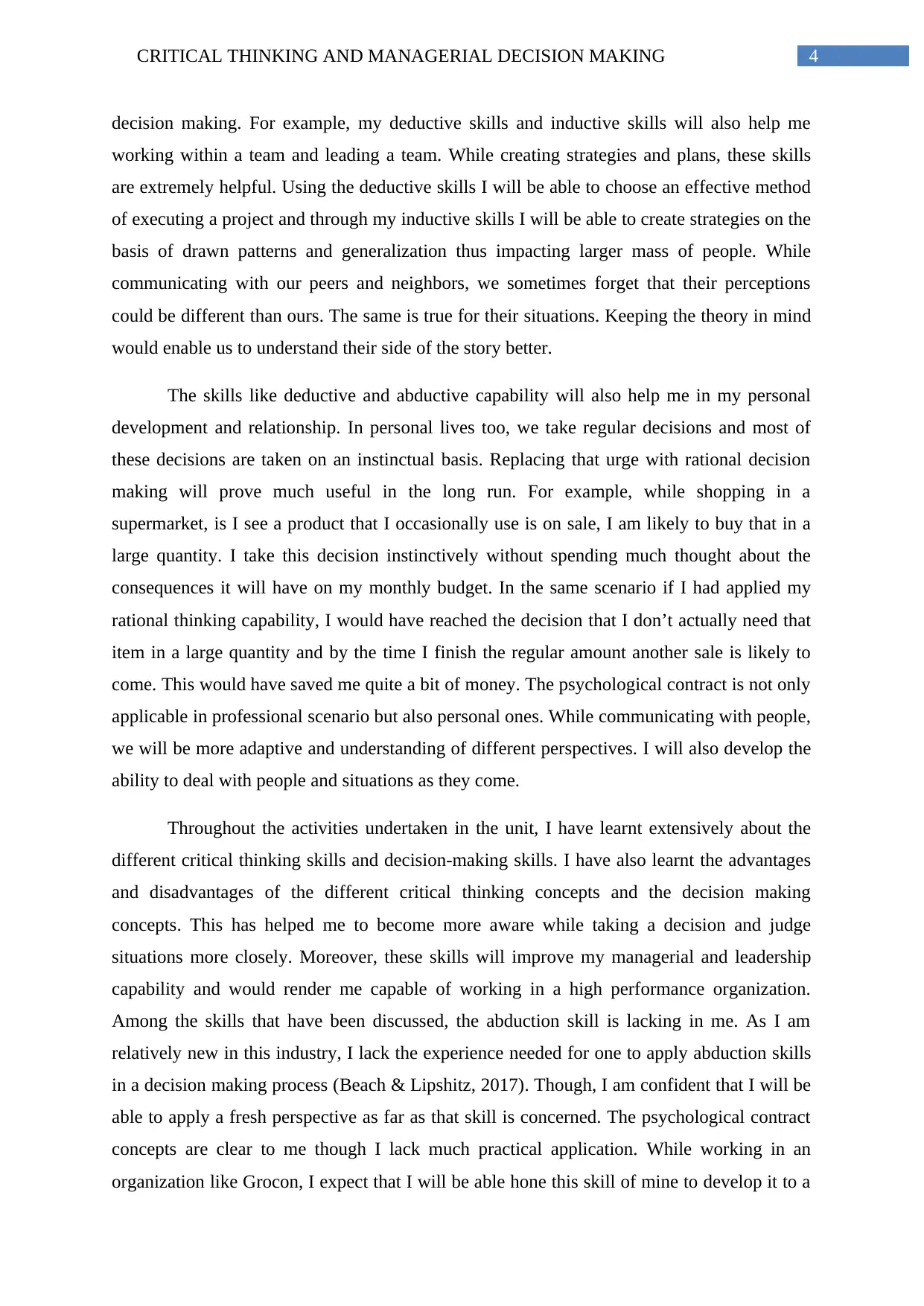
4CRITICAL THINKING AND MANAGERIAL DECISION MAKING
decision making. For example, my deductive skills and inductive skills will also help me
working within a team and leading a team. While creating strategies and plans, these skills
are extremely helpful. Using the deductive skills I will be able to choose an effective method
of executing a project and through my inductive skills I will be able to create strategies on the
basis of drawn patterns and generalization thus impacting larger mass of people. While
communicating with our peers and neighbors, we sometimes forget that their perceptions
could be different than ours. The same is true for their situations. Keeping the theory in mind
would enable us to understand their side of the story better.
The skills like deductive and abductive capability will also help me in my personal
development and relationship. In personal lives too, we take regular decisions and most of
these decisions are taken on an instinctual basis. Replacing that urge with rational decision
making will prove much useful in the long run. For example, while shopping in a
supermarket, is I see a product that I occasionally use is on sale, I am likely to buy that in a
large quantity. I take this decision instinctively without spending much thought about the
consequences it will have on my monthly budget. In the same scenario if I had applied my
rational thinking capability, I would have reached the decision that I don’t actually need that
item in a large quantity and by the time I finish the regular amount another sale is likely to
come. This would have saved me quite a bit of money. The psychological contract is not only
applicable in professional scenario but also personal ones. While communicating with people,
we will be more adaptive and understanding of different perspectives. I will also develop the
ability to deal with people and situations as they come.
Throughout the activities undertaken in the unit, I have learnt extensively about the
different critical thinking skills and decision-making skills. I have also learnt the advantages
and disadvantages of the different critical thinking concepts and the decision making
concepts. This has helped me to become more aware while taking a decision and judge
situations more closely. Moreover, these skills will improve my managerial and leadership
capability and would render me capable of working in a high performance organization.
Among the skills that have been discussed, the abduction skill is lacking in me. As I am
relatively new in this industry, I lack the experience needed for one to apply abduction skills
in a decision making process (Beach & Lipshitz, 2017). Though, I am confident that I will be
able to apply a fresh perspective as far as that skill is concerned. The psychological contract
concepts are clear to me though I lack much practical application. While working in an
organization like Grocon, I expect that I will be able hone this skill of mine to develop it to a
decision making. For example, my deductive skills and inductive skills will also help me
working within a team and leading a team. While creating strategies and plans, these skills
are extremely helpful. Using the deductive skills I will be able to choose an effective method
of executing a project and through my inductive skills I will be able to create strategies on the
basis of drawn patterns and generalization thus impacting larger mass of people. While
communicating with our peers and neighbors, we sometimes forget that their perceptions
could be different than ours. The same is true for their situations. Keeping the theory in mind
would enable us to understand their side of the story better.
The skills like deductive and abductive capability will also help me in my personal
development and relationship. In personal lives too, we take regular decisions and most of
these decisions are taken on an instinctual basis. Replacing that urge with rational decision
making will prove much useful in the long run. For example, while shopping in a
supermarket, is I see a product that I occasionally use is on sale, I am likely to buy that in a
large quantity. I take this decision instinctively without spending much thought about the
consequences it will have on my monthly budget. In the same scenario if I had applied my
rational thinking capability, I would have reached the decision that I don’t actually need that
item in a large quantity and by the time I finish the regular amount another sale is likely to
come. This would have saved me quite a bit of money. The psychological contract is not only
applicable in professional scenario but also personal ones. While communicating with people,
we will be more adaptive and understanding of different perspectives. I will also develop the
ability to deal with people and situations as they come.
Throughout the activities undertaken in the unit, I have learnt extensively about the
different critical thinking skills and decision-making skills. I have also learnt the advantages
and disadvantages of the different critical thinking concepts and the decision making
concepts. This has helped me to become more aware while taking a decision and judge
situations more closely. Moreover, these skills will improve my managerial and leadership
capability and would render me capable of working in a high performance organization.
Among the skills that have been discussed, the abduction skill is lacking in me. As I am
relatively new in this industry, I lack the experience needed for one to apply abduction skills
in a decision making process (Beach & Lipshitz, 2017). Though, I am confident that I will be
able to apply a fresh perspective as far as that skill is concerned. The psychological contract
concepts are clear to me though I lack much practical application. While working in an
organization like Grocon, I expect that I will be able hone this skill of mine to develop it to a
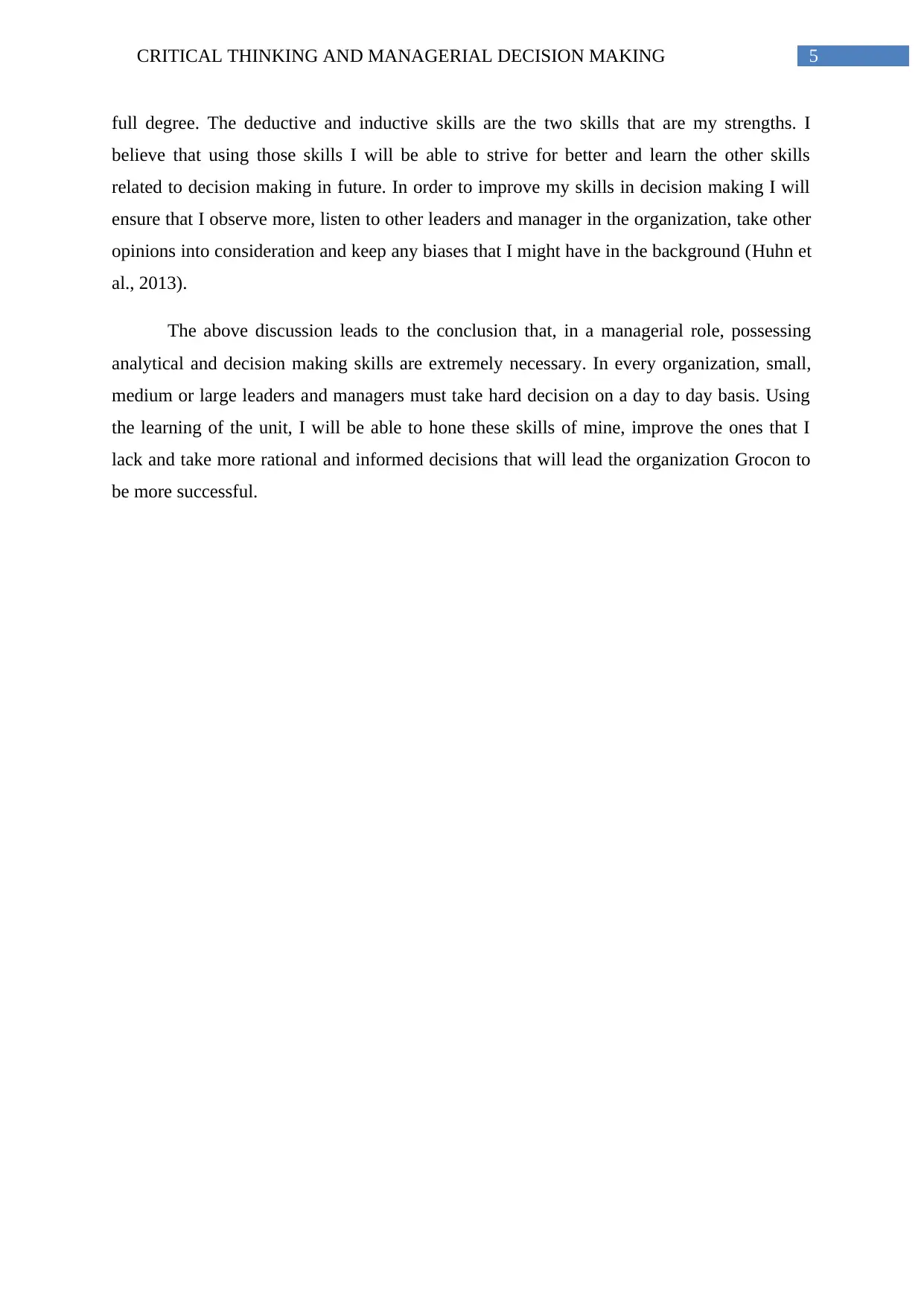
5CRITICAL THINKING AND MANAGERIAL DECISION MAKING
full degree. The deductive and inductive skills are the two skills that are my strengths. I
believe that using those skills I will be able to strive for better and learn the other skills
related to decision making in future. In order to improve my skills in decision making I will
ensure that I observe more, listen to other leaders and manager in the organization, take other
opinions into consideration and keep any biases that I might have in the background (Huhn et
al., 2013).
The above discussion leads to the conclusion that, in a managerial role, possessing
analytical and decision making skills are extremely necessary. In every organization, small,
medium or large leaders and managers must take hard decision on a day to day basis. Using
the learning of the unit, I will be able to hone these skills of mine, improve the ones that I
lack and take more rational and informed decisions that will lead the organization Grocon to
be more successful.
full degree. The deductive and inductive skills are the two skills that are my strengths. I
believe that using those skills I will be able to strive for better and learn the other skills
related to decision making in future. In order to improve my skills in decision making I will
ensure that I observe more, listen to other leaders and manager in the organization, take other
opinions into consideration and keep any biases that I might have in the background (Huhn et
al., 2013).
The above discussion leads to the conclusion that, in a managerial role, possessing
analytical and decision making skills are extremely necessary. In every organization, small,
medium or large leaders and managers must take hard decision on a day to day basis. Using
the learning of the unit, I will be able to hone these skills of mine, improve the ones that I
lack and take more rational and informed decisions that will lead the organization Grocon to
be more successful.
⊘ This is a preview!⊘
Do you want full access?
Subscribe today to unlock all pages.

Trusted by 1+ million students worldwide
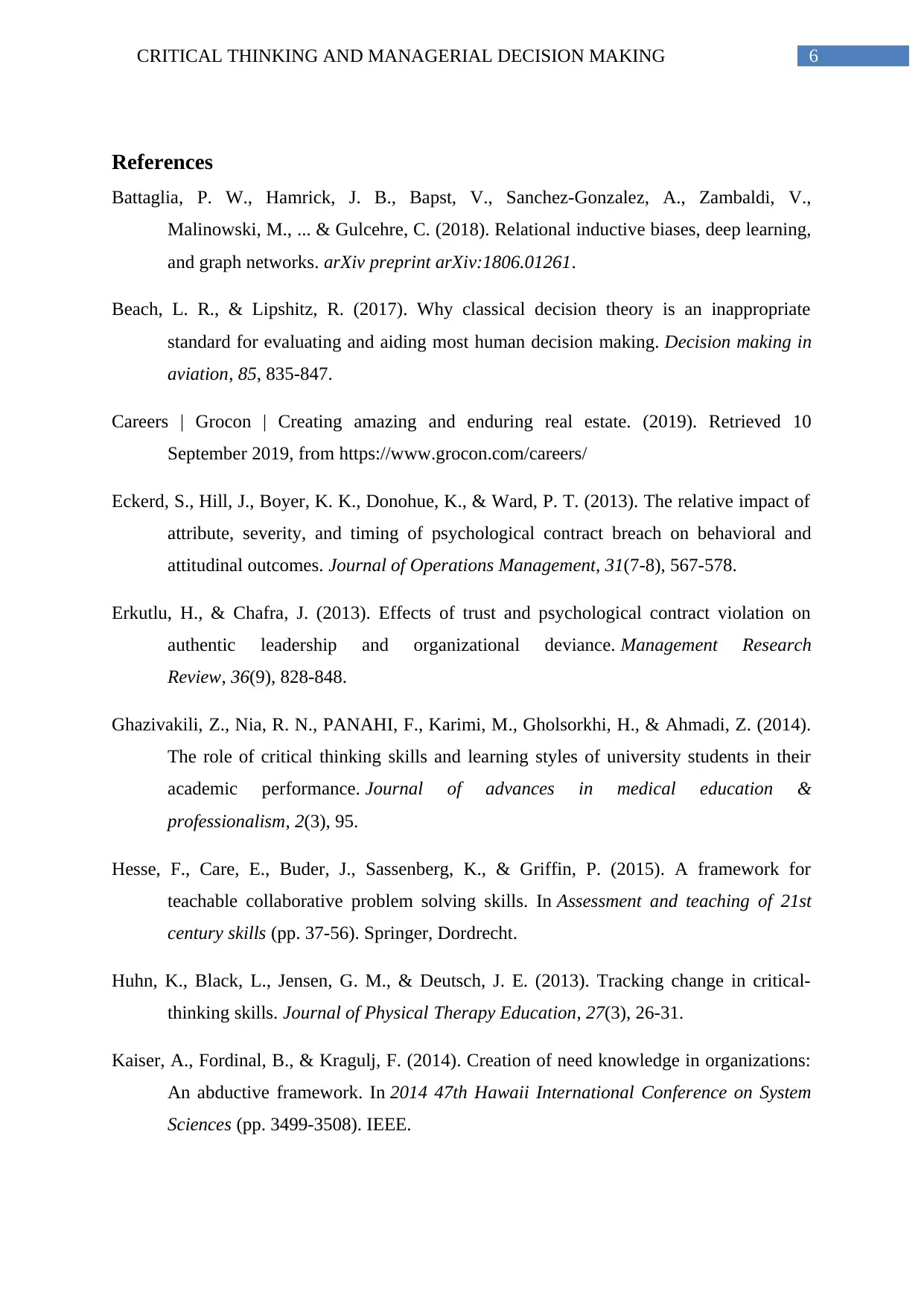
6CRITICAL THINKING AND MANAGERIAL DECISION MAKING
References
Battaglia, P. W., Hamrick, J. B., Bapst, V., Sanchez-Gonzalez, A., Zambaldi, V.,
Malinowski, M., ... & Gulcehre, C. (2018). Relational inductive biases, deep learning,
and graph networks. arXiv preprint arXiv:1806.01261.
Beach, L. R., & Lipshitz, R. (2017). Why classical decision theory is an inappropriate
standard for evaluating and aiding most human decision making. Decision making in
aviation, 85, 835-847.
Careers | Grocon | Creating amazing and enduring real estate. (2019). Retrieved 10
September 2019, from https://www.grocon.com/careers/
Eckerd, S., Hill, J., Boyer, K. K., Donohue, K., & Ward, P. T. (2013). The relative impact of
attribute, severity, and timing of psychological contract breach on behavioral and
attitudinal outcomes. Journal of Operations Management, 31(7-8), 567-578.
Erkutlu, H., & Chafra, J. (2013). Effects of trust and psychological contract violation on
authentic leadership and organizational deviance. Management Research
Review, 36(9), 828-848.
Ghazivakili, Z., Nia, R. N., PANAHI, F., Karimi, M., Gholsorkhi, H., & Ahmadi, Z. (2014).
The role of critical thinking skills and learning styles of university students in their
academic performance. Journal of advances in medical education &
professionalism, 2(3), 95.
Hesse, F., Care, E., Buder, J., Sassenberg, K., & Griffin, P. (2015). A framework for
teachable collaborative problem solving skills. In Assessment and teaching of 21st
century skills (pp. 37-56). Springer, Dordrecht.
Huhn, K., Black, L., Jensen, G. M., & Deutsch, J. E. (2013). Tracking change in critical-
thinking skills. Journal of Physical Therapy Education, 27(3), 26-31.
Kaiser, A., Fordinal, B., & Kragulj, F. (2014). Creation of need knowledge in organizations:
An abductive framework. In 2014 47th Hawaii International Conference on System
Sciences (pp. 3499-3508). IEEE.
References
Battaglia, P. W., Hamrick, J. B., Bapst, V., Sanchez-Gonzalez, A., Zambaldi, V.,
Malinowski, M., ... & Gulcehre, C. (2018). Relational inductive biases, deep learning,
and graph networks. arXiv preprint arXiv:1806.01261.
Beach, L. R., & Lipshitz, R. (2017). Why classical decision theory is an inappropriate
standard for evaluating and aiding most human decision making. Decision making in
aviation, 85, 835-847.
Careers | Grocon | Creating amazing and enduring real estate. (2019). Retrieved 10
September 2019, from https://www.grocon.com/careers/
Eckerd, S., Hill, J., Boyer, K. K., Donohue, K., & Ward, P. T. (2013). The relative impact of
attribute, severity, and timing of psychological contract breach on behavioral and
attitudinal outcomes. Journal of Operations Management, 31(7-8), 567-578.
Erkutlu, H., & Chafra, J. (2013). Effects of trust and psychological contract violation on
authentic leadership and organizational deviance. Management Research
Review, 36(9), 828-848.
Ghazivakili, Z., Nia, R. N., PANAHI, F., Karimi, M., Gholsorkhi, H., & Ahmadi, Z. (2014).
The role of critical thinking skills and learning styles of university students in their
academic performance. Journal of advances in medical education &
professionalism, 2(3), 95.
Hesse, F., Care, E., Buder, J., Sassenberg, K., & Griffin, P. (2015). A framework for
teachable collaborative problem solving skills. In Assessment and teaching of 21st
century skills (pp. 37-56). Springer, Dordrecht.
Huhn, K., Black, L., Jensen, G. M., & Deutsch, J. E. (2013). Tracking change in critical-
thinking skills. Journal of Physical Therapy Education, 27(3), 26-31.
Kaiser, A., Fordinal, B., & Kragulj, F. (2014). Creation of need knowledge in organizations:
An abductive framework. In 2014 47th Hawaii International Conference on System
Sciences (pp. 3499-3508). IEEE.
Paraphrase This Document
Need a fresh take? Get an instant paraphrase of this document with our AI Paraphraser
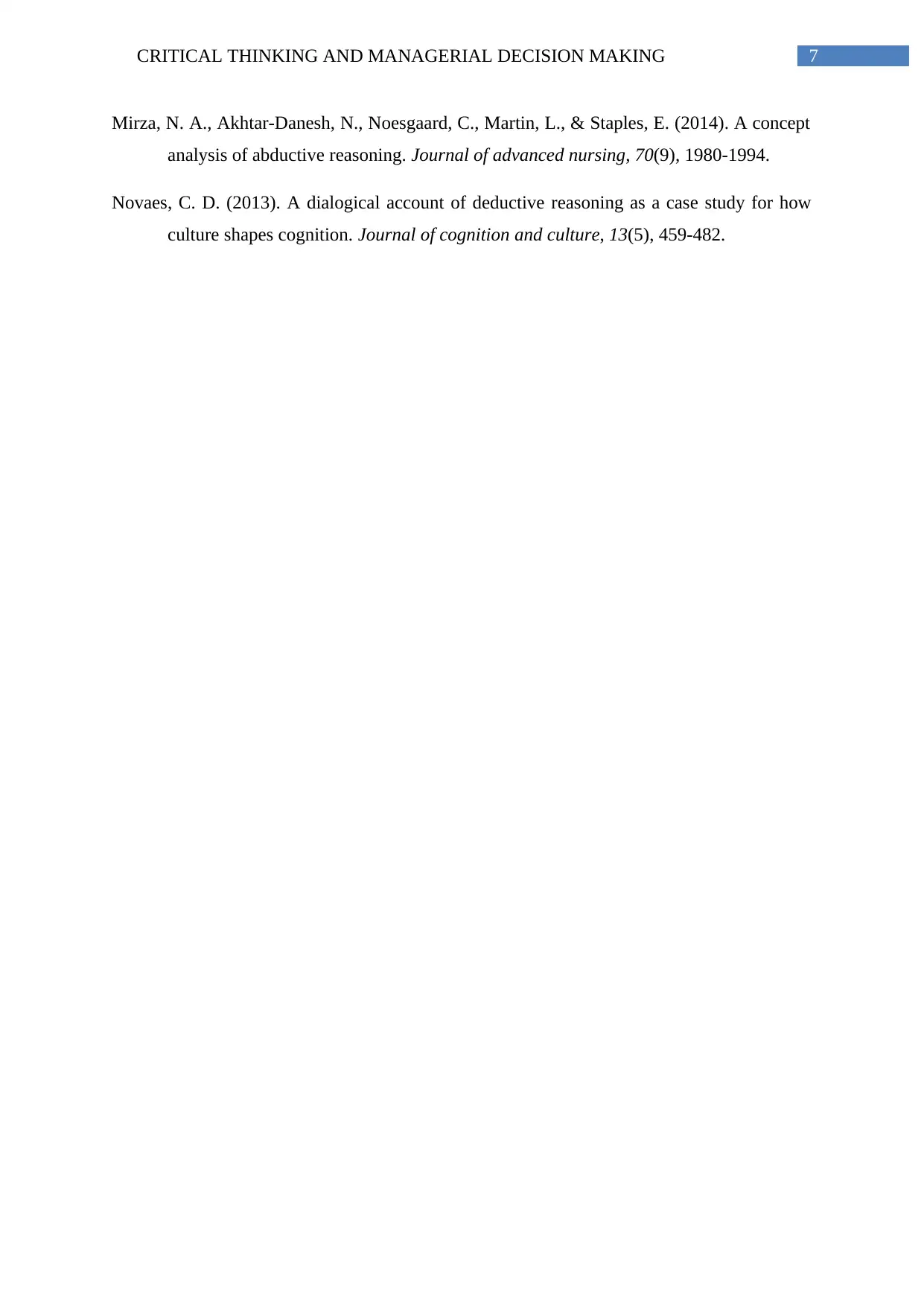
7CRITICAL THINKING AND MANAGERIAL DECISION MAKING
Mirza, N. A., Akhtar‐Danesh, N., Noesgaard, C., Martin, L., & Staples, E. (2014). A concept
analysis of abductive reasoning. Journal of advanced nursing, 70(9), 1980-1994.
Novaes, C. D. (2013). A dialogical account of deductive reasoning as a case study for how
culture shapes cognition. Journal of cognition and culture, 13(5), 459-482.
Mirza, N. A., Akhtar‐Danesh, N., Noesgaard, C., Martin, L., & Staples, E. (2014). A concept
analysis of abductive reasoning. Journal of advanced nursing, 70(9), 1980-1994.
Novaes, C. D. (2013). A dialogical account of deductive reasoning as a case study for how
culture shapes cognition. Journal of cognition and culture, 13(5), 459-482.
1 out of 8
Related Documents
Your All-in-One AI-Powered Toolkit for Academic Success.
+13062052269
info@desklib.com
Available 24*7 on WhatsApp / Email
![[object Object]](/_next/static/media/star-bottom.7253800d.svg)
Unlock your academic potential
Copyright © 2020–2026 A2Z Services. All Rights Reserved. Developed and managed by ZUCOL.




